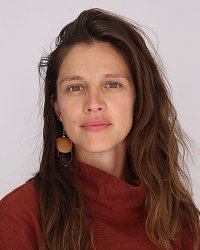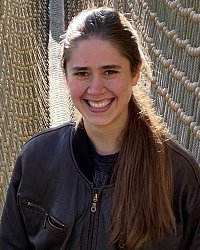 Soil organic carbon (SOC) is relevant to climate change in two crucial ways: Its turnover rate affects carbon dioxide addition to the atmosphere, and its buildup confers soil health benefits that promote agricultural resiliency in the face of a changing climate. Cellulose is arguably the most abundant biopolymer on Earth and is a major recurring source of organic carbon in both natural and agricultural ecosystems. Cellulose has a faster turnover time than the more recalcitrant lignin, making it a shorter-term control on SOC levels. In this research, de Villiers will examine the sorptive protection afforded to cellulose and low molecular weight organics under a variety of environmental conditions while integrating the use of density functional theory as a methodological technique to predict binding affinities of molecules at soil surfaces. This will further our understanding of the factors controlling cellulose decomposition rates and how we might push systems toward carbon accrual.
Soil organic carbon (SOC) is relevant to climate change in two crucial ways: Its turnover rate affects carbon dioxide addition to the atmosphere, and its buildup confers soil health benefits that promote agricultural resiliency in the face of a changing climate. Cellulose is arguably the most abundant biopolymer on Earth and is a major recurring source of organic carbon in both natural and agricultural ecosystems. Cellulose has a faster turnover time than the more recalcitrant lignin, making it a shorter-term control on SOC levels. In this research, de Villiers will examine the sorptive protection afforded to cellulose and low molecular weight organics under a variety of environmental conditions while integrating the use of density functional theory as a methodological technique to predict binding affinities of molecules at soil surfaces. This will further our understanding of the factors controlling cellulose decomposition rates and how we might push systems toward carbon accrual.
Agricultural Biodiversity for Climate Adaptation in the High Atlas: Exploring Underutilized Cereal Crops and Cereal Mixtures
Adele Woodmansee (Soil & Crop Sciences)
Advisor: Andrew McDonald
 Woodmansee’s research looks at underutilized cereal cropping practices in the High Atlas Mountains of Morocco. The High Atlas Mountains conserve in situ diversity for several Mediterranean crops, but this diversity is threatened by rapidly intensifying droughts and socioeconomic change. Cereal crops play an important role for both food and fodder in the High Atlas, but there are major gaps in knowledge about the extent and distribution of cereal diversity. Woodmansee will investigate millets and rye, underutilized cereal crops. She will also investigate cereal species mixtures (i.e., maslins), which have increasingly recognized value for adaptation but have been previously unstudied in Morocco. The project will include collections, surveys, and mother-baby trials that combine controlled irrigation trials with participatory farmer trials. This research will provide extensive knowledge about local cereal cropping practices in an understudied potential hotspot for cereal diversity.
Woodmansee’s research looks at underutilized cereal cropping practices in the High Atlas Mountains of Morocco. The High Atlas Mountains conserve in situ diversity for several Mediterranean crops, but this diversity is threatened by rapidly intensifying droughts and socioeconomic change. Cereal crops play an important role for both food and fodder in the High Atlas, but there are major gaps in knowledge about the extent and distribution of cereal diversity. Woodmansee will investigate millets and rye, underutilized cereal crops. She will also investigate cereal species mixtures (i.e., maslins), which have increasingly recognized value for adaptation but have been previously unstudied in Morocco. The project will include collections, surveys, and mother-baby trials that combine controlled irrigation trials with participatory farmer trials. This research will provide extensive knowledge about local cereal cropping practices in an understudied potential hotspot for cereal diversity.
Maximizing Establishment and Benefits of Milkweed by Assessing the Mediation Effects of Belowground Interactions on Plant Chemistry
Linnea Smith (Soil & Crop Sciences)
Advisor: Antonio DiTommaso
 Establishing milkweed stands is vital to reversing the population decline of monarch butterflies. A seed pelleting technique allowing farmers to sow milkweed seeds using a standard corn seed drill will overcome a major technological hurdle to the establishment of expansive milkweed stands. However, effects of this seed pelleting innovation on the milkweed rhizosphere microbial community and milkweed latex chemistry (crucial to monarch caterpillars) are currently unknown. This work will investigate how seed pelleting with maltodextrin affects soil microbial composition and function. We will also survey New York state farmers to determine the main factors that will promote or inhibit adoption of this new technology. We will use this knowledge to assess soil legacy effects on milkweed establishment and optimize this technology for use by farmers.
Establishing milkweed stands is vital to reversing the population decline of monarch butterflies. A seed pelleting technique allowing farmers to sow milkweed seeds using a standard corn seed drill will overcome a major technological hurdle to the establishment of expansive milkweed stands. However, effects of this seed pelleting innovation on the milkweed rhizosphere microbial community and milkweed latex chemistry (crucial to monarch caterpillars) are currently unknown. This work will investigate how seed pelleting with maltodextrin affects soil microbial composition and function. We will also survey New York state farmers to determine the main factors that will promote or inhibit adoption of this new technology. We will use this knowledge to assess soil legacy effects on milkweed establishment and optimize this technology for use by farmers.
Investigating Density Dependent Priority Effects in Streptomyces
Evangeline (Angie) Wang (Microbiology)
Advisor: Daniel Buckley
 Climate change poses a great threat to soil microbes as it changes environmental conditions that govern microbial community composition. It is important to understand the fundamental mechanisms governing community assembly in order to predict the consequences of such changes. Streptomyces, a bacterial genus that provides critical functions that benefit soils and plants, form spores that can spread widely. However, successful dispersal requires both dissemination and establishment. Wang plans to investigate bacterial colonization mechanisms by utilizing Streptomyces strains that differ in their temperature optima. She hypothesizes that bacterial colonization is governed by density-dependent blocking effects where the coefficient of selection depends on cell density. In this way, stochastic founder effects can prevent the northward dispersal of strains driven by changes in climate. This research aims to better understand bacterial competitive dynamics, which ultimately allows us to better predict soil community responses to climate change.
Climate change poses a great threat to soil microbes as it changes environmental conditions that govern microbial community composition. It is important to understand the fundamental mechanisms governing community assembly in order to predict the consequences of such changes. Streptomyces, a bacterial genus that provides critical functions that benefit soils and plants, form spores that can spread widely. However, successful dispersal requires both dissemination and establishment. Wang plans to investigate bacterial colonization mechanisms by utilizing Streptomyces strains that differ in their temperature optima. She hypothesizes that bacterial colonization is governed by density-dependent blocking effects where the coefficient of selection depends on cell density. In this way, stochastic founder effects can prevent the northward dispersal of strains driven by changes in climate. This research aims to better understand bacterial competitive dynamics, which ultimately allows us to better predict soil community responses to climate change.
